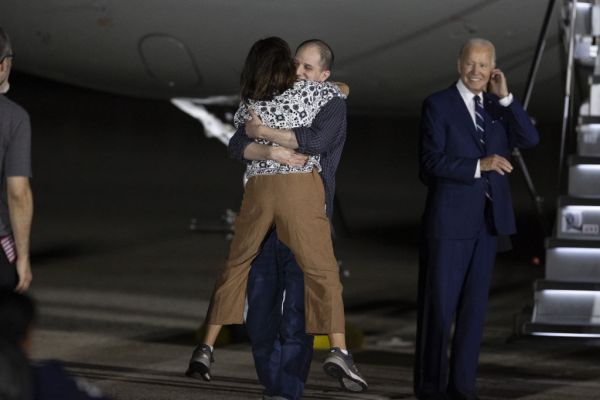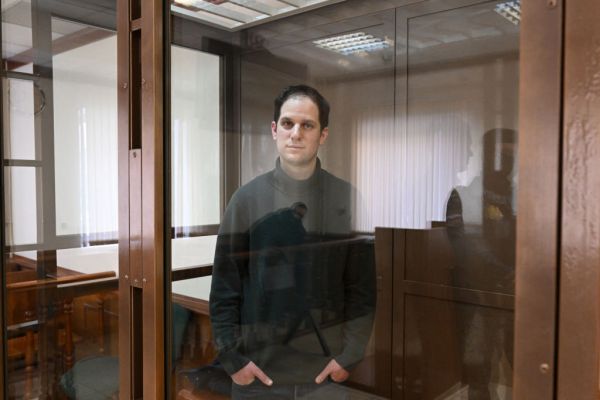Last week, as news broke that Americans freed in a prisoner swap with Russia were making their way home, Marc Fogel’s family anxiously waited to hear whether he was among them. Instead of a call from the State Department saying he was on his way home, they received a call from Fogel himself, still imprisoned.
“I realized when he called me from Rybinsk. He wasn’t en route, he wasn’t getting on a plane, nothing was happening,” said Fogel’s sister, Anne, describing the moment as a “crushing blow” for the family. “He didn’t know if he was included or not when he called me, and I did not have the heart to tell him.”
For Fogel, a 63-year-old schoolteacher from Pennsylvania, the painful ordeal marked the latest in a string of disappointments since his arrest at a Moscow airport three years ago.
In August 2021, Fogel and his wife had been returning to Russia for his 10th and final year teaching at a prestigious international school when police, acting on a tip provided by an informant, detained him for possessing a half-ounce of medically prescribed marijuana. Ten months later, a Moscow court sentenced him to 14 years in a maximum-security penal colony—a punishment his family describes as unprecedented and potentially life-threatening given his deteriorating spinal condition.
Yet the State Department has yet to declare Fogel “wrongfully detained,” and his family believes this may have cost him his freedom last week. The designation, which is assigned by the State Department to American detainees abroad on a case-by-case basis, throws the weight of the U.S. government behind securing their freedom. In Thursday’s prisoner swap, every American in Russia currently classified as wrongfully detained was released: Wall Street Journal reporter Evan Gershkovich, former Marine Paul Whelan, and radio journalist Alsu Kurmasheva, who received the designation just days before her release.
Fogel, meanwhile, remains behind bars while the Biden administration gives opaque answers to the questions about his fate. During a press conference Friday, National Security Adviser Jake Sullivan referred to Fogel’s case as a wrongful detention, despite his lack of access to the government resources that the official designation would entail. On Monday, a State Department spokesman claimed that U.S. negotiators tried, unsuccessfully, to include Fogel in last week’s deal but added that efforts were ongoing. He also noted that the department works to free Americans who aren’t officially considered wrongfully detained.
Fogel’s family members say they’ve yet to see evidence of those efforts. Three years after his arrest, the State Department hasn’t explained why Fogel’s case seemingly has been overlooked despite mounting pressure from members of Congress and his family. “They give no explanations for anything,” Anne Fogel told The Dispatch.“The standard line is: ‘The case is ongoing, and the secretary of state looks at the totality of the case before he designates.’ There’s no accountability for the State Department at all.”
Legislation regarding U.S. citizens taken hostage or wrongfully detained abroad requires the department to seriously consider a detainee for wrongful detention status if they meet at least one of 11 criteria. Lawyers representing the Fogel family believe he meets the majority of the criteria outlined in the Levinson Act, including that a citizen has been detained in large part to secure economic or political concessions from the U.S. government.
Russian state media openly articulated this goal at the time of Fogel’s arrest, floating him as a possible bargaining chip in Moscow’s efforts to secure the release of Viktor Bout—a Russian arms dealer nicknamed the “Merchant of Death”—in the months before the invasion of Ukraine. Bout was later freed in a December 2022 prisoner swap for American pro basketball player Brittney Griner, whose case bore several similarities to Fogel’s.
Both were arrested for possessing small amounts of marijuana—in Griner’s case, cannabis oil— at the Sheremetyevo International Airport, charged with violating two narcotics-related articles of the Russian criminal code, and tried and handed down exorbitant sentences by a Moscow regional court. Griner received nine years of hard labor, Fogel 14. But unlike Fogel, Griner landed the immediate diplomatic backing of the State Department, which quickly decried the “sham trial and the unjust sentencing” of the WNBA star and launched talks that brought about her eventual return home.
The parallel cases helped attract the attention of U.S. lawmakers, who have passed resolutions calling for Fogel’s release and demanding more transparency from the administration.
“He is in constant pain. His health is deteriorating. His muscles are atrophying to the point where he is losing sensation in his extremities.”
Lawyer Sasha Phillips
In response to one such resolution, the State Department this year submitted a report to Congress outlining the status of Fogel’s case that his family’s lawyer, Sasha Phillips, said indicated U.S. officials’ neglectful approach. The document, she said, lacked proper citations and contained significant factual and legal errors, including a misstatement of Fogel’s charges and the false claim that he pleaded guilty with intent to break the law. It also stated that his 14-year sentence wasn’t uncommon in the Russian legal system, even though a Russian offender charged with possession would likely receive a short sentence or fines in lieu of jail time.
“Marc’s 14-year sentence for possession of less than an ounce of medical marijuana is much harsher than the typical sentence that’s given to Russian citizens under the same circumstances. It’s even harsher than the sentence handed out to major drug traffickers, violent offenders, and even murderers,” Phillips told The Dispatch, noting a case in which the same Moscow court sentenced an individual who trafficked more than 200 pounds of heroin into Russia to 15 years. Impaired due process is one Levinson Act criterion under which Fogel would qualify as wrongfully detained.
There’s also extensive evidence that Russian authorities singled out Fogel for his work at the Anglo-American School of Moscow, a prestigious English-language academy attended by the children of foreign diplomats and military officials. The Kremlin had targeted the international school and its employees for years leading up to Fogel’s arrest, including by denying visas to its teachers and stripping it of its diplomatic status. Authorities raided the grounds following Fogel’s detention, apparently finding nothing amiss, but the school was eventually shuttered by the Russian government on unrelated grounds last year.
In addition to the political motivations undergirding Fogel’s imprisonment, the inhumane conditions under which he’s being held qualify him for wrongful detention status under the Levinson Act. A 2022 State Department report on human rights practices in Russia described its prisons as often “harsh and life threatening,” detailing overcrowding, poor sanitation, abuse by guards and inmates, and limited access to health care.
For Fogel, who has undergone multiple surgeries for a chronic spinal injury, prolonged incarceration in such an environment is particularly dangerous. “He is in constant pain. His health is deteriorating. His muscles are atrophying to the point where he is losing sensation in his extremities,” said Phillips. “This is a slippery slope down which he’s sliding, in the best case scenario, to a very significant disability and at worst—as his doctor put it—to a lethal outcome.”
Fogel’s family, which early on did not speak publicly about his case at the recommendation of U.S. officials, is now doing everything it can to raise awareness about his plight and demand answers from the U.S. government. In June, his 95-year-old mother, Malphine Fogel, filed a lawsuit against the State Department and Secretary of State Antony Blinken. In it, she asked the courts to order Blinken to perform his congressionally mandated duty of determining whether Fogel’s detention was lawful.
Seeing two high-profile prisoner swaps occur in the past two and a half years while Fogel languishes in prison has been particularly painful for his mother, sisters, wife, and two children.
“This is an American teacher. This is not a person accused of espionage. There’s nothing nefarious, there’s nothing secretive about Marc’s life. It’s all out in the open,” said Phillips. “If Marc had this wrongfully detained designation, he would be home already.”
“Instead, he is still in a Russian prison,” she added. “The fact that he was left behind for the second time is absolutely agonizing.”










Please note that we at The Dispatch hold ourselves, our work, and our commenters to a higher standard than other places on the internet. We welcome comments that foster genuine debate or discussion—including comments critical of us or our work—but responses that include ad hominem attacks on fellow Dispatch members or are intended to stoke fear and anger may be moderated.
With your membership, you only have the ability to comment on The Morning Dispatch articles. Consider upgrading to join the conversation everywhere.